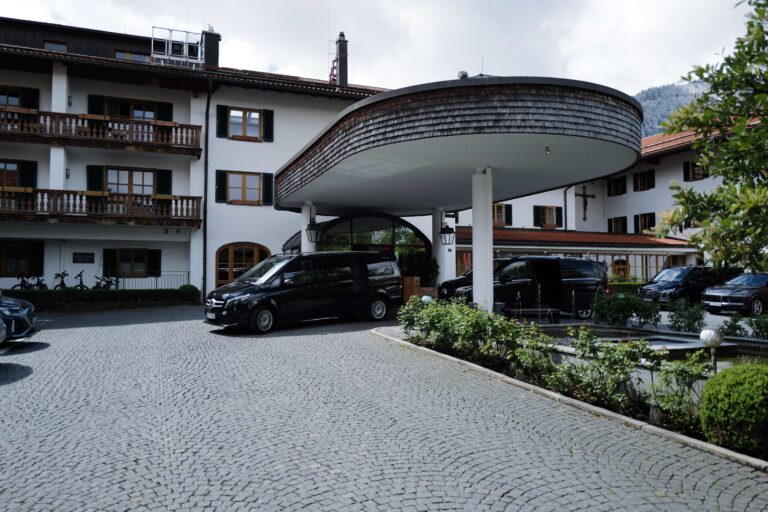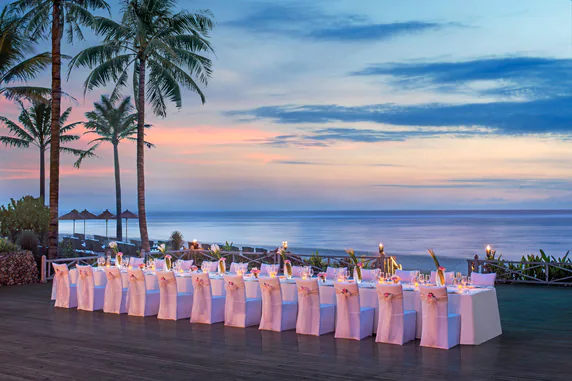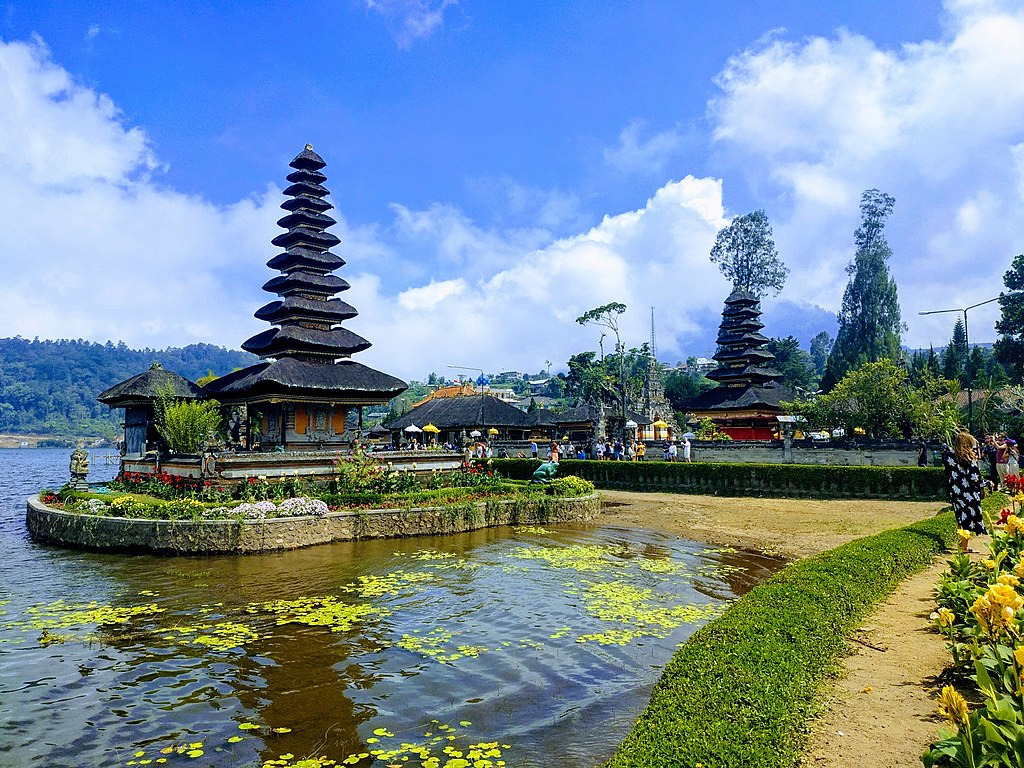
Beyond the App: Managed Ground Transportation for Germany’s 2026 Tradeshows
By The DMC Collective — Experiential & Mobility Design Agency Event & Roadshows Transport →
The choreography behind a tradeshow
The opening day of ILA Berlin 2026 is barely dawned, and the city hums with motion.
Airport carousels turn, hotel lobbies echo with rolling cases, and every route to Messe Berlin is heavy with anticipation.
For hundreds of delegates, exhibitors, and crew members, this moment is the start of something vast — and yet, what defines the day isn’t just the show floor or the stand design.
It’s the precision in how people arrive.
How they move, connect, and transition between meetings, dinners, and receptions.
In short: how the experience travels.
Behind that choreography sits a discipline few see but everyone feels — managed ground transportation.
When it works well, no one notices. When it doesn’t, nothing else quite recovers.
At The DMC Collective, we believe mobility is the silent architecture of success.
Our work begins not at the exhibition hall, but at the first door that opens.
1. Why logistics became leadership
In 2026, trade events across Germany — from IFA Berlin to HANNOVER MESSE, IMEX Frankfurt, and Interpack Düsseldorf — have grown into international ecosystems.
Companies now send entire departments, cross-functional teams, and VIP guests. That expansion brings visibility — and complexity.
Transport, once left to taxis and expense reports, is now a strategic pillar of event planning.
Why? Because movement influences time, security, efficiency, and ultimately, brand experience.
“Transport is the thread that ties a thousand details together,”
says Chris Budhmire, Senior Transport Director at The DMC Collective.
“When it’s designed, the day feels calm. When it’s improvised, everyone feels the cracks.”
2. The hidden costs of unmanaged travel
On paper, a €25 taxi seems efficient. Multiply that by fifty people, four days, multiple events, and it becomes a web of receipts, surcharges, waiting time, and unpredictable service quality.
The unseen drains:
- Fragmented billing: dozens of receipts, tip variations, delayed reimbursements.
- Surge pricing: during major exhibitions, rideshare platforms in Berlin, Frankfurt, and Düsseldorf often apply 2–3× multipliers.
- Coordination loss: delegates scattered across multiple vehicles arrive out of sync, missing pre-briefs or client introductions.
- Security risk: non-vetted drivers, inconsistent standards, and language barriers.
- Operational stress: every “Where are you?” message steals energy from your event’s focus.
A centralised approach changes this entirely. Managed ground transportation transforms chaos into control, visibility, and accountability.
3. The logic of managed ground transportation
At its core, managed ground transportation is not a product — it’s a partnership.
It blends logistics expertise, hospitality standards, and live operations.
Each movement is mapped, scheduled, and monitored by professionals who know the terrain, the venues, and the stakes.
At The DMC Collective, our in-house transport division delivers this through:
- Chauffeur and executive coach services owned and operated under our supervision.
- Dedicated planners who coordinate vehicle waves, driver assignments, and route timing.
- On-ground coordination teams stationed at hotels, airports, and event sites.
- Live dispatch centres using GPS tracking and traffic analytics to adjust routes in real time.
- Airport meet & greet with multilingual hosts and branded signage.
- Conference shuttles linking multiple hotels, venues, and restaurants.
- Post-show event transfers — dinners, networking receptions, and client entertainment.
- On-disposal services for executives and sponsors requiring flexible mobility.
- Centralised billing and reconciliation, ensuring clean audit trails and cost predictability.
- 24-hour operations desk for flight delays, cancellations, and last-minute adjustments.
And because tradeshows are international by nature, our driver and coordination teams operate in English, German, French, Korean, Spanish, Italian, Japanese, and Chinese — ensuring that no delegate ever feels lost in translation.
“When delegates can communicate in their own language, confidence rises,”
notes Yuki Takahashi, one of DMC’s senior Japanese-speaking chauffeurs.
“That comfort reflects on the host company — it shows care.”
4. Efficiency that saves more than money
The key value of managed transport lies not in fares, but in flow.
Every minute recovered, every delay avoided, is capacity restored to your team’s performance.
- Predictability
Vehicles operate on known schedules, coordinated with exhibition entry times and traffic restrictions.
- Security
Professional chauffeurs, verified fleets, and clear liability coverage protect both guests and reputation.
- Cohesion
Group arrivals maintain visual consistency; guests arrive together, ready for briefings or client engagement.
- Convenience
No downloading of apps, no scrambling for receipts — only one itinerary, one team, one standard.
For senior delegates or key clients, that seamlessness becomes part of your hospitality story.
5. The DMC Collective at work — ILA Berlin
When DMC managed transport for over 1,000 international delegates at ILA Berlin, the brief was precision without stress.
We mapped four airports, eight hotels, and three event venues into a single ecosystem of movement.
- 140 vehicles deployed
- Real-time flight integrations
- Multilingual meet-and-greet teams
- Conference shuttle loops for internal sessions and off-site dinners
- Rapid reallocation for late-night networking events
The result:
- 98% on-time performance
- Zero missed transfers
- Complete billing transparency
- Reduced delegate transit time by 22% compared to unmanaged travel
Delegates didn’t see the complexity — only the calm.
That’s the measure of effective ground management: when the system becomes invisible, and the experience feels inevitable.
6. Mobility as brand expression
Transport is more than logistics; it’s theatre in motion.
The journey from airport to hotel, hotel to venue, venue to dinner — these are brand touchpoints.
Each one communicates something about your company’s culture and professionalism.
We design every detail to echo that identity:
- Vehicle interiors spotless, scent-neutral, and equipped for comfort.
- Driver presentation — discreet, informed, and culturally aware.
- Arrival rhythm — no rush, no confusion, only quiet precision.
- Evening atmosphere — calm transfers between receptions, lounges, and private dinners.
For post-show events — from IMEX networking receptions to IFA Berlin brand parties — our teams handle group pick-ups, late-night returns, and flexible scheduling. Because the conversation doesn’t stop when the exhibition closes; it continues across the city, and your mobility should enable it, not interrupt it.
7. The conference shuttle ecosystem
Large exhibitions often span vast grounds — Messe Frankfurt alone covers nearly 600,000 m².
For multi-hall, multi-hotel events, shuttles are the veins of the operation.
DMC’s shuttle programmes are built like flight schedules:
- Fixed loops at peak times.
- Demand-based routing in quieter hours.
- Real-time digital boards and branded signage at pick-up points.
- Coordinators in radio contact with dispatch HQ.
- Spare capacity vehicles for overflow or VIP usage.
We’ve deployed this system at HANNOVER MESSE, interpack Düsseldorf, and Light + Building Frankfurt, ensuring punctual transfers for thousands daily.
Centralised shuttle management also reinforces sustainability — fewer empty runs, optimised fuel use, and reduced congestion around venues.
8. Sustainability meets innovation
- Why 2026: A cinematic, low-key island made for small-format buy-outs—think Fort George and private estates.
- Access tip: Fly to Split (SPU) and use catamarans; shoulder seasons deliver capacity and value.
- Best for: C-suite off-sites and creative leadership gatherings that need privacy.
- Sustainability cue: Shoulder-season timing and compact group sizes protect local rhythm and resources.
- Engagement cue: Maker sessions in private estates lead to a shared leadership charter; AI produces a succinct highlights reel for post-retreat accountability.
9) Liechtenstein — precision and privacy
Corporate mobility is now part of ESG reporting. That’s why we’ve invested in hybrid and electric fleets, route-optimisation software, and CO₂ tracking tools.
In 2026, several German Messe grounds — Berlin, Frankfurt, and Hannover — will offer green-lane access for low-emission vehicles.
Clients using DMC’s managed systems gain both priority routing and measurable carbon reductions.
It’s sustainability with structure: environmentally conscious, operationally efficient, and brand-aligned.
9. City intelligence: local expertise that matters
Every German exhibition city carries its own rhythm.
- Berlin
Multiple airports, creative quarters, unpredictable closures — demands flexibility and insider navigation.
Our Berlin teams know the shortcuts from Tempelhof to Messe, the one-way systems in Charlottenburg, and how to keep a convoy moving through the capital’s heart.
- Düsseldorf
Compact and elegant but congested during EuroShop and interpack.
DMC’s pre-booked city shuttle grids prevent bottlenecks and ensure VIP comfort even at peak hours.
- Frankfurt
The financial centre thrives on punctuality.
We coordinate tightly between Messe Frankfurt, downtown hotels, and the airport — with time buffers built into every schedule.
- Hannover
Expansive venues, longer distances.
We deploy a layered bus system with satellite coordinators to keep every hall connected.
Such city fluency is what turns transport from movement into mastery.
10. The multilingual difference
Global exhibitions mean global conversations.
A driver who can greet a client in their own language — Korean, Japanese, Chinese, Italian, French, or Spanish — delivers more than convenience; they deliver confidence.
Our multilingual drivers undergo cultural etiquette training, not just linguistic instruction.
They understand what punctuality means to a Japanese engineer, how to assist a French delegation gracefully, and when to allow space for quiet conversation.
Every DMC transport team member is trained to represent your hospitality as their own.
11. Time as the new luxury
In the tradeshow world, time is the only truly finite asset.
Every minute not spent waiting is a minute earned for strategy, networking, or rest.
Managed ground transport returns time to your people.
They step out of a vehicle not hurried, not flustered, but ready.
And that state of readiness is what converts opportunity into partnership.
12. Why reliability builds trust
Events are reputational stages.
A late car can undo weeks of preparation. A missed shuttle can sour a senior meeting.
Reliability is no longer optional — it’s part of brand equity.
When clients or executives are moved by DMC systems, they don’t just arrive on time; they arrive with trust intact.
That trust compounds over years, creating relationships rooted in professionalism.
13. The DMC Collective advantage
The DMC Collective integrates transportation into every layer of experiential design.
From stand construction to hospitality planning, our transport planners sit at the same table as creative directors and producers.
Our capabilities include:
- Chauffeur and executive coach services
- Multilingual drivers (EN, DE, FR, ES, IT, JA, ZH)
- Shuttle and bus fleet operations
- Airport and rail meet & greet
- Post-show event attendance and hospitality transfers
- Dynamic route monitoring
- Centralised billing and reconciliation
- Sustainability reporting
Our clients benefit from unified accountability — one contact, one vision, one invoice.
“We’re not just moving people,”
says Marco Stein, DMC’s Head of Mobility.
“We’re designing calm into the most chaotic week of their year.”
14. Future-ready transport technology
Artificial intelligence now supports our dispatch systems — predicting demand spikes, monitoring traffic density, and suggesting optimal fleet deployment.
Our planners use live dashboards that integrate with exhibition timetables, flight feeds, and client itineraries.
Yet the foundation remains human: experienced coordinators making decisions with empathy and experience.
Technology refines; people reassure.
15. Connecting the dots — movement as hospitality
When mobility is designed with intention, it becomes part of the brand’s hospitality narrative.
Each leg of the journey — from arrival to evening reception — reinforces the same promise: we take care of you.
In 2026, exhibitors will compete not just on innovation, but on ease — the sense that every detail flows without friction.
Managed ground transportation is the infrastructure of that ease.
16. Final reflections
No one remembers the traffic jam that never happened.
They remember how calm the day felt, how effortless the transitions seemed, and how your team always appeared composed.
That’s the quiet power of managed mobility.
It’s not about cars — it’s about confidence.
When logistics are invisible, professionalism shines.
The DMC Collective — Event & Roadshows Transport
From chauffeur fleets to conference shuttles, multilingual chauffeurs to post-show event coordination, The DMC Collective provides end-to-end managed transport for Germany’s major exhibitions.
🔗 Explore our full service range → Event & Roadshows Transport
📧 info@thedmccollective.com
🌐 thedmccollective.com

Related Articles

Nirup Island: Indonesia’s Exclusive Destination for Luxury Corporate Events
Nirup Island, nestled within Indonesia’s serene Riau Archipelago, stands out as a sophisticated choice for intimate luxury events, including board meetings, incentives, and exclusive partner seminars tailored for multinational audiences.

Why is Bali a Leading Destination for Corporate Event Spaces, and What Has Made Its Resorts Renowned Worldwide?
Discover why Bali is a top choice for corporate events, with world-class resorts and stunning venues that attract businesses from around the globe.

Corporate Incentive Travel Services in Bali: Why Bali Remains a Top Choice for Incentive Travel Planners
This article explores why Bali remains a top choice for incentive travel planners and highlights some of Indonesia’s hidden gems that deserve a spot on the radar of forward-thinking planners.
